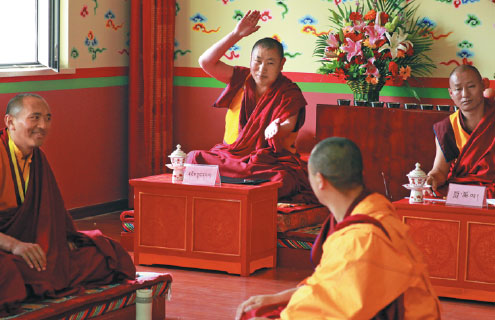Taking a new road to enlightenment
Updated: 2016-03-25 08:05
By Xu Wei(China Daily)
|
|||||||||
|
Monks at the High-level Tibetan Buddhism College of China debate the scriptures. Provided to China Daily |
Monasteries and colleges
Traditionally, Tibetan Buddhist monks, including Living Buddhas, receive their education in monasteries.
"Tibetan Buddhism has its own tradition of awarding academic qualifications, but there is still a lack of national recognition for the academic achievements of revered masters," Liu, the college vice-president, said.
One of the biggest problems is that many Living Buddhas who trained in monasteries gain no recognition for their deep knowledge of Buddhist teaching. "They can only say they have received a primary or high school education, despite the fact that they have studied Tibetan Buddhism for decades," he said.
"It's possible that their knowledge of Tibetan Buddhism is much deeper than that of a college professor, but there are no national-level certificates to prove it," he said. Students who apply for the college's Tho Ram Pa and Chi Ram Pa programs have to pass exams about the Tibetan Buddhist canon before they are allowed to enroll.
The four major schools of Tibetan Buddhism generally follow similar curricula and adhere to the same Indian root texts and commentaries, according to Kalzang Yuknyin. "Another criteria for enrollment is that the student must be determined to devote himself to the study of Buddhism," he added.
Because the number of students is still low, the college aims to double the number of monasteries with which it has partnerships by 2020, from 24 to 48, and last year, it began compiling textbooks for the students.
The three-year Tho Ram Pa program is divided into two sections, with 60 percent of classes devoted to the study of Buddhist scriptures and 40 percent to general knowledge, including Mandarin, computing, legal studies, modern Chinese history and ethnic and religious policies.
Candidates must also complete studies of most of the five major Mahayana sutras, the classics of Tibetan Buddhism that every monk must study and understand. Traditionally, it takes several decades to study all five sutras and attain the rank of senior monk.
Kalzang Yuknyin said many of the students were highly respected as Living Buddhas in their home areas, so it will be a challenge for them to put their status to the backs of their minds and adopt the modest attitude expected of students.
"They need to realize that first and foremost they are students here. We keep reminding them that they need to keep studying to live up to their titles," he said.
Today's Top News
President optimistic for Sino-German cooperation
Info sharing 'is key' as Europe faces terror threat
Uneasy times as Belgium mourns the dead
Belgian bombing suspect still at large: Prosecutor
Belgian media withdraws reports of suspect's arrest
Brussels bombers were brothers El Bakraoui
Chinese citizens in Belgium get help after attack
Europe ramps up security in wake of Brussels attacks
Hot Topics
Lunar probe , China growth forecasts, Emission rules get tougher, China seen through 'colored lens', International board,
Editor's Picks

|

|

|

|

|

|







